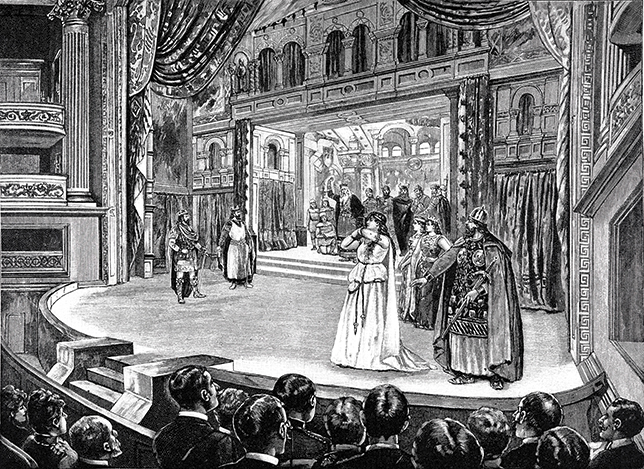I have been thinking a lot about the role higher education plays in building engaged citizens lately – and I must admit to feeling rather overwhelmed. I wonder how we prepare our students for the future of work and instill job readiness, build social and emotional intelligence into the curriculum, design rigorous experiential learning opportunities, create flexible learning environments, indigenize our classrooms and institutions, and ensure accessibility – while also delivering foundational disciplinary content?
In these moments, I recall Parker Palmer’s advice in The Courage to Teach to connect with “the mentors who evoked us and with the subject of study that chose us” to make sense of the forces that converge in our lives. So what can Shakespeare – and theatre more generally – teach us about teaching civic engagement?
The answer came to me this summer when I taught an immersive field-study course called ENG225 Shakesperience. Over the course of eight days, our class travelled to the Stratford Festival and turned the small town of Stratford, Ontario, into our classroom. We watched six plays but also learned about the backstage life of the largest repertory theatre in North America. We participated in dance and stage-combat workshops, toured behind-the-scenes stages, dressed up in vintage costumes in the vast costume warehouse, and met with cast members, education associates, dramaturges and academic directors. This all-access backstage pass enabled students to view theatre through multiple lenses, which underscored the deeply collaborative nature of making art and building community.
What struck me about our time at the Stratford Festival was that, first, a thriving arts culture is essential to a healthy democracy; and second, our deep engagement – as spectators, learners and patrons – is essential to the production of meaning, whether that is in the theatre, the classroom, or society more generally.
Shakespeare frequently reminds us that audience members are key participants and crucial collaborators in the play, not merely passive consumers. In Henry V, the Chorus demands that the audience harnesses their imaginations if the play has any chance of succeeding: “Can this cock-pit hold / The vasty fields of France? Or may we cram / Within this wooden O the very casques / That did affright the air at Agincourt?” (Prologue, 11-14).

Urging the audience to compensate for the actors’ “imperfections” by employing their own “imaginary forces,” the Chorus emphasizes that spectators must take an active role in fulfilling the theatrical illusion. In other words, the world doesn’t create itself: audience members partner with the actors, the text and the space in order to make something extraordinary. Otherwise, the theatre is just an ordinary “wooden O” – stripped of its potential for transforming us all.
This model of collaborative engagement is essential to maintaining a civil and just society. John Dewey, American philosopher and educator, coined the term “creative democracy” in a speech he delivered in 1939 in response to the rise of fascism. He posits that democracy is a moral ideal continually constructed through actual effort by people; he argues that “the present crisis is due in considerable part to the fact that for a long period we acted as if our democracy were something that perpetuated itself automatically.” Writing in 1939, Dewey’s insights are shockingly relevant to our current global climate.
Dewey concludes, “Since it is one that can have no end till experience itself comes to an end, the task of democracy is forever that of creation of a freer and more humane experience in which all share and to which all contribute.” Whether it is the theatre, or the classroom, or democracy, nothing can be created alone. Each of these institutions is in perpetual motion, always in the act of becoming, and co-created through individual effort and collaborative spirit. ENG225 Shakesperience is not a course that coaches actors or teaches stage managers or instructs dramaturges. There are other programs – and far more qualified instructors – that deliver skills-based training. This is not a course on what to do but how to be in the world.
I no longer despair that I have to do it all: instead, we can harness foundational disciplinary knowledge to build capacities for future skills, deploy rigorous experiential learning opportunities, facilitate flexible learning environments, and increase accessibility. At the heart of our efforts, however, is to encourage “inventive effort and creative activity” that Dewey believes is required to tackle the “critical and complex conditions of today.”
